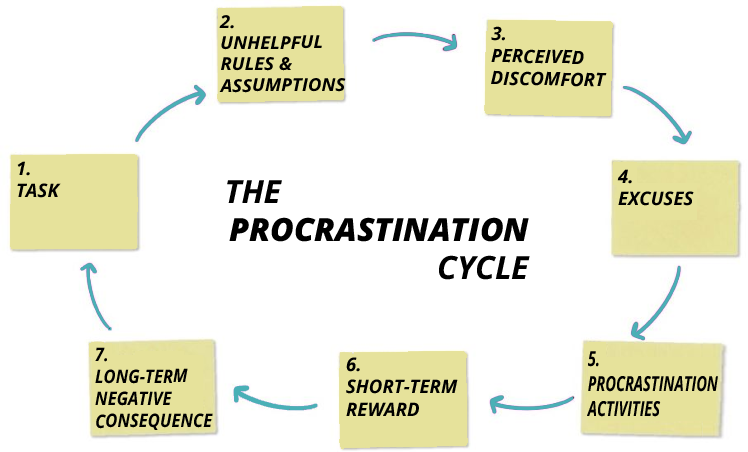Maintaining your focus: What is procrastination?
![]() Procrastination refers to the process of delaying work on an important task or assignment, usually by engaging in less important tasks as a distraction or avoiding work altogether. Procrastination often occurs when an individual feels overwhelmed by everything they have to do.
Procrastination refers to the process of delaying work on an important task or assignment, usually by engaging in less important tasks as a distraction or avoiding work altogether. Procrastination often occurs when an individual feels overwhelmed by everything they have to do.
Earlier in the resource you considered how your timetable as an online learner might be different to that of students studying on a university campus. You have the flexibility to design your own timetable; however, you need to make sure it allows you to fit your studies around other commitments. When dealing with competing demands on your time you will want to make the best use of each study session you have. Therefore, in order to avoid procrastination and stay focussed it is important to develop strategies to help you stay motivated.
In this section of the resource you will be introduced to practical tips, tools and strategies to help you maintain your focus.
Step one
Understanding of the psychology and causes of procrastination will help you to anticipate situations where you might be more likely to procrastinate. The reasons why you are tempted to delay starting on a piece of work might vary slightly from those of other people; however, procrastinating behaviour always follows a similar pattern or cycle.
The diagram below demonstrates the pattern of thoughts and behaviour which can lead to procrastination and continue the cycle once it has started. Read about each stage of the cycle and consider how they link together.

-
Task
All procrastination starts here. I have a task, challenge or goal to achieve.
-
Unhelpful rules and assumptions
We often start with unhelpful mental rules or assumptions that get in our way. Some of the most common are:
- I need to be in charge.
- Life’s too short.
- I’m too tired.
- I can’t do it.
- If I don’t try, I can’t fail.
- It must be perfect.
- I need to be in charge.
-
Perceived discomfort
My mental rules make me feel anxious and uncomfortable, so I look for escape.
-
Excuses
In looking to escape the discomfort, I generate excuses.
- I don’t have everything I need.
- I don’t have enough time to do it now.
- I’m not motivated enough now.
- There’s plenty of time to do it later.
- It’s too sunny to be working inside all day.
- I’ve got to ring my parents/clean the house/eat some toast first.
- I don’t have everything I need.
-
Procrastination activities
I engage in any activity other than the task at hand. These procrastination activities are more pleasurable but considerably less important than my original task.
-
Short-term reward
In doing more pleasurable activities than my original task, I get a short term reward in enjoying the activity I’m doing, and in avoiding the potential discomfort that would have resulted from my unhelpful rules and assumptions.
-
Long-term negative consequences
My urge to procrastinate is intensified. I now consider my original task to be even more unpleasant than before, my unhelpful rules and assumptions are reinforced, and the perceived discomfort is intensified.
I continue to procrastinate. My work piles up and I feel stressed. The procrastination cycle continues.
Do you want to learn more about the causes of procrastination?
The diagram above is an extract from the My Learning Essentials online resource, Now or never? Understanding the procrastination cycle (downloadable/printable version). The resource was developed in partnership with colleagues at the University of Manchester Counselling Service. See the full resource for further information.
Contrary to popular belief procrastination is generally not the symptom of laziness, but the result of distorted thoughts and assumptions we all have about ourselves and our work. Once these negative thoughts start to drive the procrastination cycle it can be very difficult to stop.
As an online learner you will be responsible for motivating yourself to complete work to deadlines. You won’t have a set schedule other than the schedule you make for yourself. Recognise your own unhelpful assumptions/attitudes/excuses as they arise and try to challenge them.
Suggested follow-up actions:
Question
The next time you feel tempted to procrastinate (whether it is related to your course or not) reflect on the reasons why. Are they based on evidence? Would you think this about anyone else on your course?
Ask others
Speak to other students on your course to see how they are finding the work (you will often find they are worried about the same things).
Create
A diagram of your own procrastination cycle.
Review
Any actions you have taken. What has worked/what hasn’t? Continue to try out new things and develop your strategy.
